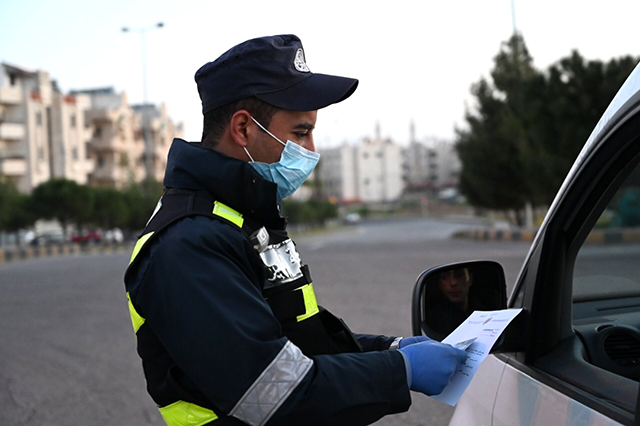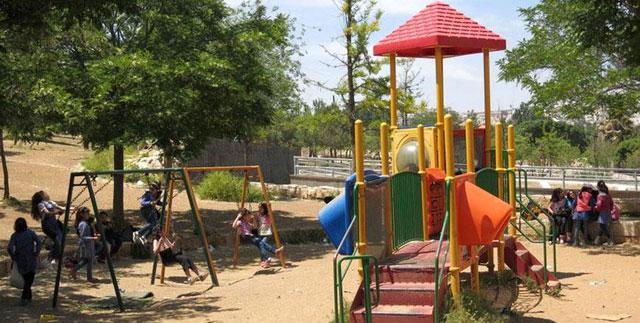You are here
GAM survey gauges impact of awareness campaigns amid coronavirus pandemic
By Maram Kayed - Aug 25,2020 - Last updated at Aug 25,2020

Face masks have become an indispensable part of daily life. The Greater Amman Municipality has launched the results of a survey examining the effect of its awareness campaign about the COVID-19 crisis (Photo by Amjad Ghsoun)
AMMAN — The Greater Amman Municipality (GAM) has launched the results of a survey examining the effect of its awareness campaign about the COVID-19 crisis as part of a project supported by Bloomberg Philanthropies, the World Health Organisation and Vital strategies.
The survey was conducted as part of Partnership for Healthy Cities, a global network of 70 cities that focuses on the prevention of non-communicable diseases.
The partnership is now expanding its scope to address the pandemic by using its existing relations with the leaders of cities, stated the study, a copy of which was made available to The Jordan Times.
Deputy City Director for Health and Agricultural Affairs Mervat Mheirat told The Jordan Times in a phone interview that the municipality is “very satisfied with the sample of the study as well as its results, as it shows a high responsiveness on our citizens’ part”.
The survey asked a sample of citizens about their awareness about the COVID-19 crisis and their opinion regarding the impact that GAM’s awareness campaigns have had on protecting the public from the virus threat.
The questionnaire consisted of 15 multiple choice questions with five-point or four-point scales and was distributed on the Internet through Google templates and Facebook, reaching some 198,000 users.
The GAM’s team also distributed 2,000 copies of the questionnaire in hard copy in various areas of Amman, with 1,469 copies answered.
The responses were then uploaded to the computer, making the study’s total sample reach 2,701 citizens.
“The aim of analysing the responses is to measure the impact of previous awareness campaigns and to know the issues that have to be focused on in future awareness campaigns,” said Mheirat.
The sample consists of citizens between the ages of 15 and 60. The study’s biggest sample, however, is the 20-45 age group.
The results showed that the hard copy sample has a higher response from males than females, while the online sample had the opposite result.
More than 53 per cent of the study’s sample are university graduates, more than 19 per cent have some form of higher education such as a master’s degree or a PhD, and only 2 per cent have not had a formal education.
After analysing the results of the question “evaluate your knowledge of COVID-19 crisis”, the study concluded that social media outlets are the most important platforms that citizens resort to for information.
Although Facebook had the biggest impact among respondents, the citizens “did not neglect the role of TV channels, radio stations, Instagram, Whatsapp groups or news websites,” stated the study.
Facebook’s impact was rated at “moderate, high and very” by 16 per cent, 26 per cent and 51 per cent of citizens respectively.
“This is quite a significant finding because now that we know that citizens rely on social media, particularly Facebook of all the others, we now know where to focus our attention,” said Mheirat.
For other outlets, more than 87 per cent said that the benefit of TV channels pandemic information was either big, very big or medium. However, the bigger proportion of citizens said radio stations’ role was either poor or medium.
As for GAM’s awareness campaigns, the study concluded that they have had a “big impact” on citizens.
The best method to deliver awareness messages, as preferred by a high fraction of citizens, was through photos and short videos.
Citizens believe that their commitment to prevention procedures is “very high” while the adherence levels of those surrounding them are “medium.”
However, the study’s results also showed that citizens believe that, people seemed to be “well acquainted with health instructions” in public transportation and workplaces.
In restaurants, however, the commitment to health and safety measures stood at “medium”.
The results also showed that citizens were “well acquainted” with the disposal methods of medical equipment used for the prevention of the virus.
The study’s sample seemed to have an “optimistic” look regarding the time needed for the COVID-19 pandemic to end, as a high percentage said it would end “very soon,” and that the duration needed for the virus to fade away is at a medium-term rather than a long-term.
More than 52 per cent of citizens believe that the precautions necessary to deal with COVID-19 needed to be very high, but Mheirat said that a “very concerning” finding was that 9 per cent do not believe in the existence of the virus or in the need to take precautionary measures to prevent it.
“The study has been eye-opener in that regard, as now we know that there is still work to be done in raising citizens awareness about the pandemic,” she concluded.
Related Articles
AMMAN — The second “Put It Out” campaign, a collaborative effort to enforce tobacco control under Public Health Law 47, was launched on Sund
AMMAN — A quantitative survey study, targeting civil society institution leaders in Jordan as well as local community and national activists
AMMAN — The Greater Amman Municipality (GAM) has issued health and safety instructions for entering parks and public facilities, which were














